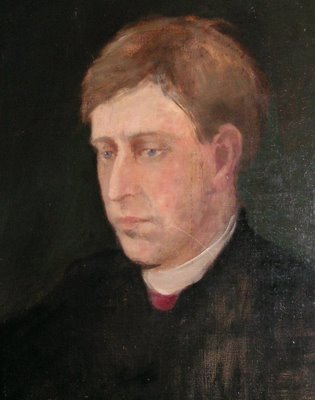The youngest son of E.W. Benson, Archbishop of Canterbury, who, as head of the Anglican Church, was the upholder of the Protestant Establishment in England, as such, his son's conversion to Roman Catholicism in 1903, and his subsequent ordination, caused a sensation. Not since Newman's conversion almost sixty years earlier had the reception of a convert into the Church caused such a commotion. Shudders of shock shook the Anglican establishment, whereas many Catholics rejoiced at the news of such a high profile coup with unrestrained triumphalism.
There is no doubt that the new convert belonged to a remarkable family. Apart from his father's rise to ecclesiastical prominence as head of the Church of England, both of Benson's brothers became leading members of the Edwardian Literati. A.C. Benson, his eldest brother, was master of Magdalene College, Cambridge, and built a reputation as a fine biographer, diarist, and literary critic, writing acclaimed studies of Rossetti, Fitzgerald, Pater, Tennyson, and Ruskin. The other brother, E.F. Benson, wrote prolifically and is best known to posterity for his satirical Mapp and Lucia novels which have been successfully adapted for television. Yet Robert Hugh Benson was not to be outshone by his older siblings. Before his untimely death in 1914, at the age of 43, he would write 15 highly successful novels.
Hilaire Belloc was so impressed by Benson's historical novels that he wrote enthusiastically of him to A.C. Benson in 1907 that it was "quite on the cards that he will be the man to write some day a book to give us some sort of idea what happened in England between 1520 and 1560."
In "A Spiritual Aeneid", Monsignor Ronald A. Knox confessed candidly that Benson's influence was crucial to his own conversion: "I always looked on him as the guide who had led me to Catholic truth - I did not know then that he used to pray for my conversion." The other great influence on Knox's conversion was G.K. Chesterton and it is perhaps no surprise that Benson was a great admirer of Chesterton.
The youngest son of E.W. Benson, Archbishop of Canterbury, who, as head of the Anglican Church, was the upholder of the Protestant Establishment in England, as such, his son's conversion to Roman Catholicism in 1903, and his subsequent ordination, caused a sensation. Not since Newman's conversion almost sixty years earlier had the reception of a convert into the Church caused such a commotion. Shudders of shock shook the Anglican establishment, whereas many Catholics rejoiced at the news of such a high profile coup with unrestrained triumphalism.
There is no doubt that the new convert belonged to a remarkable family. Apart from his father's rise to ecclesiastical prominence as head of the Church of England, both of Benson's brothers became leading members of the Edwardian Literati. A.C. Benson, his eldest brother, was master of Magdalene College, Cambridge, and built a reputation as a fine biographer, diarist, and literary critic, writing acclaimed studies of Rossetti, Fitzgerald, Pater, Tennyson, and Ruskin. The other brother, E.F. Benson, wrote prolifically and is best known to posterity for his satirical Mapp and Lucia novels which have been successfully adapted for television. Yet Robert Hugh Benson was not to be outshone by his older siblings. Before his untimely death in 1914, at the age of 43, he would write 15 highly successful novels.
Hilaire Belloc was so impressed by Benson's historical novels that he wrote enthusiastically of him to A.C. Benson in 1907 that it was "quite on the cards that he will be the man to write some day a book to give us some sort of idea what happened in England between 1520 and 1560."
In "A Spiritual Aeneid", Monsignor Ronald A. Knox confessed candidly that Benson's influence was crucial to his own conversion: "I always looked on him as the guide who had led me to Catholic truth - I did not know then that he used to pray for my conversion." The other great influence on Knox's conversion was G.K. Chesterton and it is perhaps no surprise that Benson was a great admirer of Chesterton.
Family Members
Sponsored by Ancestry
Advertisement
Advertisement














